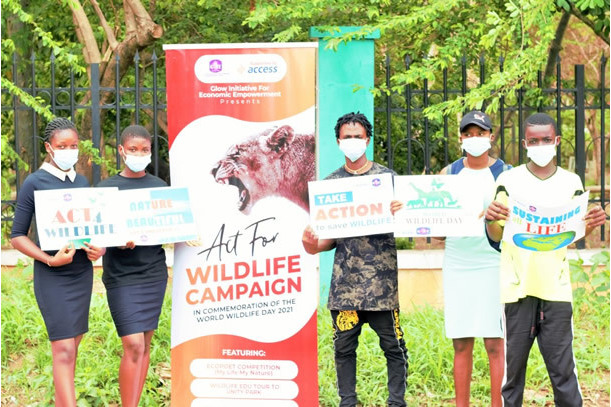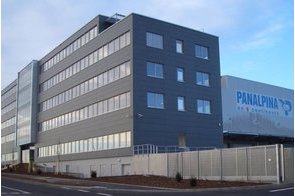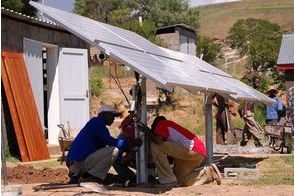Access Bank’s environmental sustainability credentials

Summary
Through its Green Social Entrepreneurship Program, Access Bank has empowered 238 entrepreneurs, 70% of whom are women.
Environmental sustainability has become a major global agenda; and as such, it requires practical and urgent action. Rapid urbanisation, industrial growth, and the ever-increasing human population have intensified the use of natural resources. At the same time, these factors have also increased the need to protect the natural environment.
A United Nations report, “The Climate Crisis – A Race We Can Win”, affirms that no part of the earth is untouched by the effect of human activities or pollution. Natural resources are being depleted at an alarming rate and are also being contaminated with toxic chemicals, potentially leaving a future world in which the young generations would live in to be quite endangered. It is little wonder that young people are becoming very vocal about environmental sustainability.
Nevertheless, it has become imperative that all hands are on deck to preserve the planet and consciously combat the alarming rate of anthropogenic activities. This informs the Sustainable Development Goals on clean water and sanitation (SDG 6), sustainable cities and communities (SDG 11), and SDG 12 – responsible production and consumption. Governments, communities, organisations, stakeholder groups and individuals need to enunciate policies and take positive actions for the environment.
Access Bank Plc has been a trailblazer in the financial services industry by main-streaming sustainability into its corporate strategy, processes, operations and stake-holder engagement. The bank's approach to integrating Environmental, Social and Governance (ESG) considerations into its management processes and long-term strategies began 13 years ago, several years before sustainable finance became popular in the Nigerian banking industry and other financial jurisdictions.
Access Bank was the first financial institution in Nigeria to deploy a customised Sustainable Finance Toolkit to assist in screening projects to identify potential environmental and social (E&S) risks. The bank also contributed significantly to the development and adoption of the Nigerian Sustainable Banking Principles (NSBPs) in 2012. The NSBPs are a set of nine principles that provide the framework for a sustain-able banking system in Nigeria.
As the convener of the first-ever Nigeria Sustainable Finance Week in collaboration with the United Nations Environment Programme Finance Initiative (UNEP FI) and the Netherlands Development Company (FMO) in 2011, Access Bank succeeded in sensitising stakeholders in the Nigerian financial sector about opportunities in sustainable finance.
Following its successful merger with Diamond Bank in 2019, Access Bank has strengthened its sustainability purpose statement: “Impacting lives positively now and in the future.” This is reflected in the bank’s current Access More campaign, launched to communicate the sustainability statement of “More Access to Inclusion,” “More Access to Finance,” “More Access to Green Products/Services,” “More Access to Quality Education,” “Quality Healthcare,” and “More Access to Safe Water.”
The following are some of the initiatives of the bank in promoting environmental sustainability:
Paper-to-Pencil Initiative: Access Bank has been recycling old and some used notebooks/paper souvenirs of Access Bank and Diamond Bank (now absorbed into the former) and old newspapers to pencils. Over 10,000 primary and secondary school students have benefited from this initiative.
Tyre Upcycling: Access Bank is collecting and upcycling old tyres into usable furnished materials. This is being executed in partnership with the FABE Foundation as part of Access Bank’s commitment to reducing environmental degradation.
Sustainable Waste Management: Access Bank successfully pioneered sustainable waste management in the Nigerian banking industry by recycling paper, plastic, glass and aluminium cans. This initiative has grown over the years with the introduction of purposeful education and re-education programme modules for the bank’s staff. The bank has gone a step further to empower vendors with recycling trucks to maximise their capacity. Access Bank currently recycles across 82 locations nationwide.
Alternative Energy: Access Bank has been promoting opportunities to harness energy derived from environmentally friendly means. The bank currently has 58 branches powered by alternative energy (hybrid), 605 solar-powered ATMs nationwide, LED lights in all its facilities in Nigeria, motion-sensitive lights, and water-efficient taps.
In addition, the bank has adopted a system that demands for regular reporting, monitoring, and evaluation of electricity consumption across its branches.
Resource Efficiency: To ensure environ-mental protection, Access Bank automated all its processes to improve efficiency and limit the impact on the environment. This is demonstrated through its “No Paper Initiative”, which demands the reduction of paper consumption. Some activities under this initiative include paper saving tips and automated systems.
Water Efficiency: Access Bank educates its staff on the importance of responsible consumption of water and encourages them to be good custodians of clean water – an important but limited resource. The bank takes daily practical steps towards ensuring mindful consumption or use of water, including installing water-efficient flush systems and taps. The institution also conducts innovative campaigns and communication through videos and factsheets to keep employees constantly aware of the realities of water availability around the world.
Green Social Entrepreneurship Program: Recognising the business opportunities in the use of clean cook stoves as an alternative to using wood or charcoal for cooking, Access Bank partnered with SME Funds, an international social enterprise focused on ending poverty by promoting sustainable initiatives, to implement the Green Social Entrepreneurship Program. The program focused on empowering entrepreneurs with clean cooking stove technology to replace existing cooking technologies that are harmful to health and the environment.
The clean stove technology makes it economically feasible to convert waste-based biomass to biofuel. The stove makes use of bio-gels, which are made from water hyacinth, biocremol, caustic soda, fragrance, and chlorophyll.
Through this program, Access Bank has empowered 238 entrepreneurs, 70 per cent of whom are women, with easy access to start-up capital. The program has been able to alleviate poverty, given the participation of micro and small businesses, while mitigating climate change. In total, so far, the entrepreneurs have reported returns of over N15.7 million through the production and distribution of over 7,500 litres of bio-gel. Additionally, 598 households and about 2,100 beneficiaries have had access to low-cost cooking fuel and stoves, leading to the displacement of 287 metric tons of carbon dioxide equivalent (MTCO2 Eq.) in emissions.
Family Clean Cooking Support Program: In partnership with SME Funds, Access Bank developed the Family Clean Cooking Support Program for under-privileged households across Nigeria. Amidst the COVID-19 lockdown, over 5,000 litres of biofuel was distributed to support over 2,500 families in 100 cities and communities through over 900 small business owners. This resulted in daily savings of N1,300.00 per family. The efficiency of the clean cook stove resulted in saving approximately 225,000 minutes of time for cooking, and eliminated 8,000 tons of CO2 equivalent.
World-Wide Life Champions Program: In partnership with Glow Initiative for Economic Empowerment, Access Bank implemented the Save Wildlife program in Enugu State. The program held across four communities in the state, namely Orieani Amechi, Udeji Amechi, Enugu Ngwo, and Garriki Awkunanaw. The goal of the program is to build knowledge, positive attitude, and best practice in wildlife conservation amongst local community dwellers. The program established conservation clubs in schools to sensitise the students to, and make them advocate for, effective wildlife conservation.
Over 250 hunters and farmers were educated on making wildlife conservation a daily habit in the Ngwo community. Additionally, 280 community school students were enlightened on the necessities of saving wildlife, and school conservation clubs were created in four communities. Overall, over 2,120 people were impacted by the Save Wildlife program.
Solar Skills Empowerment Program: Access Bank also partnered with Glow Initiative to train young Nigerians in Ebenebe village, Anambra State, on solar energy, helping them to acquire skills for operating in the value chain. This initiative aimed to empower solar panel designers, installation engineers, assemblage assistants, and repair/maintenance professionals. 60 young men and women were trained on solar PV design, marketing and sales, repair and installation, and solar PV entrepreneurship.
Green Bond: In line with its commitent to creating a strong and climate changeresilient economy, Access Bank launched the pioneering Climate Bonds Initiative (CBI) certified corporate green bond in Africa to finance and refinance environmentally beneficial projects. Eligible sectors for the bond’s proceeds include flood defiance, green housing and buildings, clean water and transportation, sustainable waste management, solar energy.
Access Bank's efforts in environmental sustainability have earned it global recognition as the first commercial bank in Africa to achieve the highest sustainability certification under the Sustainability Standards and Certification Initiative (SSCI) by the European Organization for Sustainable Development (EOSD). The bank has continued to garner international awards and recognitions such as the Karlsruhe Award for Outstanding Business Sustainability Achievement (five-time consecutive winner), World Finance Award for Most Sustainable Bank (ten-time winner), and Central Bank of Nigeria Award for Sustainable Bank of the Year (three-time consecutive winner).
Financial Nigeria reporting
Related
-
Panalpina, CMA CGM sign sustainability agreement for maritime transport
CMA CGM and Panalpina have committed to reduce CO2 emissions by 30 percent and 22 percent, respectively, by 2025.
-
Volkswagen didn't keep it real
There can be no doubt that Volkswagen clients and the public at large now perceive its lofty purpose to lack authenticity.
-
First two projects for Africa Climate Fund get approval
The AfDB-managed ACCF was established in April 2014 with a EUR 4.725 million contribution from Germany with the objective ...










